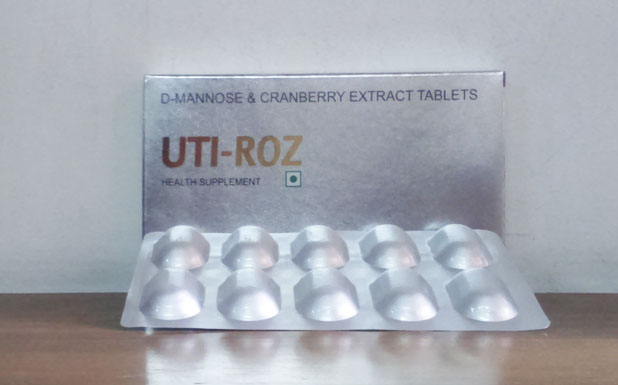Tablet Presentation
Each tablet contains:D-Mannose 600 mg
Cranberry Extract 300 mg
Flavonoids are the most common group of polyphenolic compounds in the human diet and are found ubiquitously in plants. There are several distinct classes of flavonoids found in cranberries. Cranberry flavonoids include anthocyanins, the pigments that give cranberries their rich red color, flavonols (polyphenols), and proanthocyanidins.
On the other hand, D-Mannose is a sugar monomer of the aldohexose series of carbohydrates. The empirical formula of D-mannose is C6H12O6 and its molecular weight is 180.2.
Indications
-
TRACFREE Tablets are beneficial for urinary tract health and helps to prevent urinary tract infections (UTIs).
Clinical Pharmacology
Cranberry
Cranberry and urinary tract infection (UTI): The proposed mechanisms of action include anti-adherence, antibacterial and changes in urine acidity (pH).Adhesion of E. Coli bacteria to cells lining the urinary tract is the first step in the development of a UTI. Cranberry proanthocyanidins contains type-A linkages and have been associated with preventing adhesion of P-fimbriated uropathogenic Escherichia coli (E. coli, Staphylococcus and Klebsiella. Cranberry constituents (i.e. Proanthocyanidins and fructose) have been shown to inhibit pili mediated adhesion to uroepithelial cells in vitro. While fructose inhibits type 1 pili mediated adherence, Proanthocyanidins have been demonstrated to inhibit type P pili mediated adherence. Proathocyanidins (PACs) with type-A linkages isolated from cranberry exhibit bacterial antiadhesion activity against both antibiotic-susceptible and antibiotic-resistant strains of uropathogenic P-fimbriated Excherichia coli bacteria.
Antioxidant, anti-inflammatory actions and indirect effect on bacteria by change in intravesical pH by the different phenolic acids (polyphenols) present in cranberries are the other secondary means by which beneficial effects are seen in the management of UTI.
Anthrocyanins have an antioxidant action which may also impart beneficial effects.\
D-mannose
D-Mannose is a simple sugar that occurs naturally in some plants, including cranberries. Although small amounts of D-Mannose are metabolized by the human body, much of it is rapidly excreted in the urine. Hence, D-Mannose is mostly filtered through the kidneys and routed to the bladder. In a well hydrated mamal, 90% of mannose ingested is excreted unconverted into the urine within 30-60 mintues, with 99% of the remainder being excreted within the following 8 hours. Because insubstantial amounts of D-Mannose are used by the body, it does not interfere with blood sugar regulation. There is no significant increase in blood-glucose levels during this time.Anti-adhesive effect in UTI: The bladder lining is comprised of polysaccharide molecules. In the bladder, D-Mannose can adhere to undesirable foreign bacteria, preventing them from sticking to the lining of the bladder. Finger like projections on the cell surface of E. Coli bacteria adhere to these molecules, initiating an infection. In the presence of D-Mannose, E. coli preferentially attach to D-Mannose molecules forming a complex which is expelled with the next voiding. Further, around 5% of the total daily dose of D-mannose is converted to mannitol which produces a local diuretic action and helps in flushing and elimination of bacteria from the urinary tract.
Drug Interactions
The activity of warfarin has been potentiated in the presence of cranberry, but the potential for a pharmacokinetic effect has been questioned. Current studies clearly state that there is no drug interaction with aspirin or clopidogrel.Contraindications
These Tablets are contraindicated in patients who are known to be hypersensitive to any of the ingredients of the formulation.Adverse Effects
Cranberry and D-mannose are both classified as Generally Regarded as Safe (GRAS) dietary supplements.Cranberry in high doses can produce gastrointestinal symptoms such as diarrhea. D-mannose may cause diarrhea and bloating and in high doses may affect the renal function.
Precautions & Warning
Because of D-mannose component, caution should be exercised while prescribing TRACFREE Tablets in patients with acute or chronic renal failure.Usage in Pregnancy,Lactation & Children
There are some published papers which have concluded the positive protective action of cranberry in asymptomatic bacteriuria in pregnancy. However, the risk benefit ratio should be considered by the treating physician.There are no adequate and well controlled studies with cranberry and/or D-mannose in pediatric population.
Storage
Store in a cool, dry and dark place.Protect from light.
Keep out of reach of children.
Know About new DCGI Approved Products
Copyright © by Alaina Pharma. All rights reserved.
Created by Alaina Pharma
